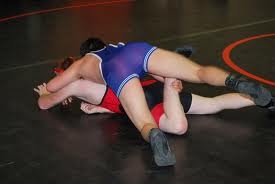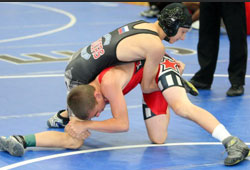Freestyle wrestling is a hard game and A successful wrestler needs to master only a couple of leg attack takedowns, and escape or reversal, a ride/breakdown, and one pinning combination. However, in order to master this small number of moves will require drilling regularly all of the possible setups, counters, and finishes. It has been my observation that the world-class wrestlers spend the majority of their time drilling the moves to perfection, and don’t really wrestle ‘live” that much. Of course during their careers they have wrestled “live” so much that most things are second nature to them.
The following are the ten things that I believe are essential to become a champion.
1.Be academically eligible. If you are you aren’t allowed to compete you can’t be a champion no matter how good you are.
2. Be strong enough to not be over-powered by any opponent. It isn’t necessary to be the strongest wrestler, but it helps. You need enough upper body strength to neutralize your strongest opponent’s attempts to over power you.
3. Be in as good or better condition than any of your opponents. Being able to wrestle as hard the last 10 seconds of the match as the first 10 seconds is very important Countless numbers of matches.
4. Have a superior leg attack defense. The highest percentage takedowns are leg attacks i.e. single leg, double leg, high crotch, Ankle pick, inside and outside fireman’s carry. If you can stop all of the takedown attempts of any opponent you can wrestle more aggressively.
5. Have a superior defense on bottom. You cannot get ridden for more than 15 seconds if you want to be a successful college wrestler. A inside leg standup is probably the most common escape used at the college level. You also can’t let your opponent break you down or turn you for a nearfall or pin.
6. Master a leg attack series. A single leg or double leg takedown should be the first takedown you master.
7. Master a breakdown/ride. It is important to be able to control your opponent on the mat. In many cases it will be necessary to win by 1 point. In college riding time frequently determines who wins thematch.
8. Master a pinning combination series. Half nelsons, cradles, chicken wings, etc. You need to know how to set up your opponent so he’ll fall into a pin hold before he realizes it.
9. There will be times when there is less than one minute left in a match and you are trailing by 3 or more points. In these situations a leg takedown isn’t going to win the match for you, it will only make the score closer. You need a 5-point move from the down and neutral position in these situations. This is when it is time to pull something out of your “bag of tricks”. It will be a move that is fundamentally sound, but is not frequently seen by most wrestlers.
10. Last, but certainly not least is mental toughness. In my opinion wrestling is 90 percent mental. The successful wrestlers in college or at the world level are pretty equal in terms of technical skills. Occasionally there will be one superior athlete compared to the others. However, it usually comes down to the wrestler who wants to win the most that determines the outcome of a match. I’ve seen wrestlers who weren’t as good as athletes as other wrestlers, but they found ways to win. A wrestling match is a test of “wills”, if you keep constant pressure on your opponent throughout the entire match eventually almost all of them will give up at some point, because they are exhausted physically and/or mentally.
There is many clubs around who offers good coaching and summer wrestling camp. There is many wrestling club in NY too One the best wrestling club that I’ve known is VhwClub .


